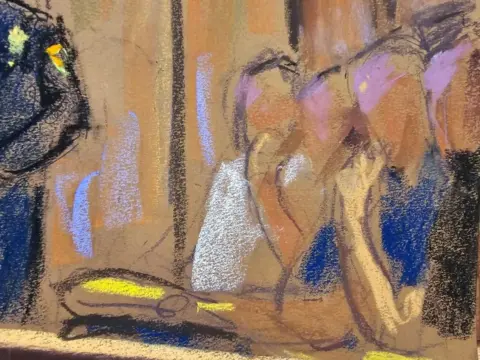50 minutes ago
Ana Faguy,BBC News, Washington

 Reuters
Reuters
A New York jury began deliberating on the case against Donald Trump on Wednesday
After weeks of testimony, 12 New York City jurors are sitting in a Manhattan courthouse room to decide the fate of former President Donald Trump's hush-money case.
The jury is in their second day of deliberation and a verdict could come at any time. On Wednesday they deliberated for four and a half hours.
Mr Trump has pleaded not guilty to 34 counts of falsifying business records in relation to a hush-money payment made to adult-film star Stormy Daniels. She claims she had sex with the former president and he denies the encounter.
Here's what you need to know about how a jury reaches a verdict, as the prosecution, defence and much of the world awaits an answer.
How long can the verdict take?
There is no limit on how long the jury can deliberate.
There are recorded instances of juries taking months to make their decision.
In 1992, a California jury debated for four and a half months in a civil rights lawsuit brought against the city of Long Beach.
But in some cases, juries reach a quick consensus.
In 2004, a jury acquitted a New Zealand man in 60 seconds after he was charged with cultivating 23 marijuana plants.
The 60-second mark has passed, but it's unclear if the Manhattan jury will need more than four months to decide Mr Trump's fate.
Does the verdict have to be unanimous?
Yes.
The jury has to unanimously agree on two points: whether Mr Trump committed the crime of falsifying business records and whether he did or did not do so with the intent to unlawfully influence an election.
After those two decisions are made there is room for disagreement among the jury.
In his instructions, Justice Juan Merchan explained the jury does not need to unanimously agree which laws Mr Trump and his co-conspirators potentially broke to influence the election.
The jury can consider several options: tax law violations, falsification of other business records and breaking the Federal Election Campaign Act.
Ultimately, though, they all have to agree that he falsified business records with the intent to conceal the second crime in order for prosecutors to secure a conviction.
If a jury cannot reach any agreement, the judge usually asks them to return to the deliberation room and try again, an instruction known as an Allen charge.
Does the jury get the judge's instructions in the deliberation room?
The short answer is no.
The 55-page instructions in printed form are not allowed inside the deliberation room.
In New York, both parties and the judge have to agree to allow printed jury directions to be given to the jury.
In this case, not all the parties agreed.
Jurors could take notes and ask questions when Justice Merchan read the instructions aloud on Wednesday. They asked the judge to repeat the directions - which they can request again at any time.
You can read the jury instructions here.
What will we know about the decision?
Much of the information the public will learn about the decision will depend on what the members of the jury choose to share after the verdict.
During the 2018 trial for former adviser to Mr Trump, Paul Manafort, jurors chose to speak to members of the media to discuss the case and the verdict.
With 12 jurors and six alternative jurors it is possible someone will speak about their experience.
And once Justice Merchan dismisses the jury, they will be free to do so.
But given the intense scrutiny they could face for their high-profile decision, jurors may not want to speak out in this case.



 6 months ago
20
6 months ago
20








